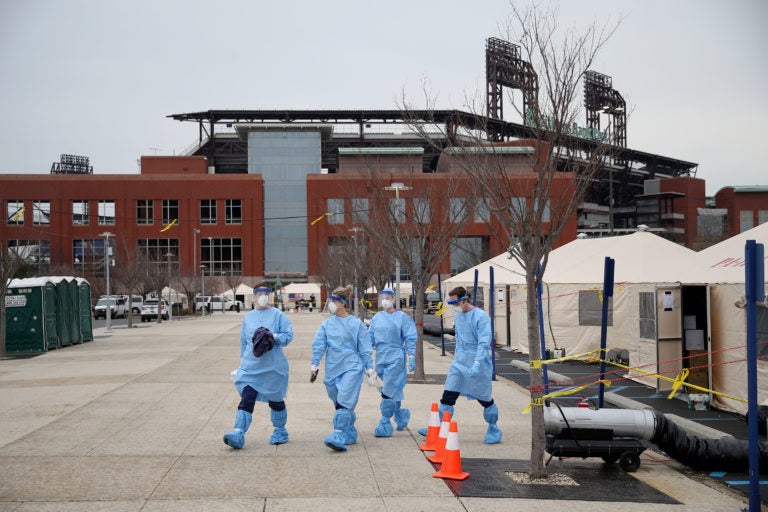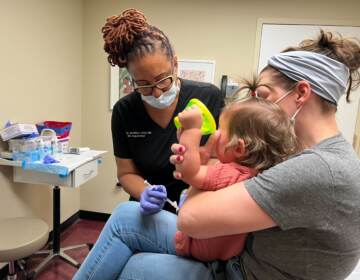Loss of FEMA funds is behind Friday closure of 2 local drive-through test sites
Citizens Bank Park and Temple Ambler test locations will close. FEMA says they were intended as “immediate high-impact intervention” for initial testing.
Listen 1:14
Philadelphia Medical Reserve Corps volunteers (from left) Megan Boyle, Marina Spitkovskaya, Jamie Huot, and Stephen Bonett, all of whom are nurses, walk to the swabbing tent as the city's coronavirus testing site prepared to open next to Citizens Bank Park in South Philadelphia on Friday, March 20, 2020. (Tim Tai/The Philadelphia Inquirer)
Pennsylvania is nearing the peak of its COVID-19 outbreak, according to multiple projections, and widespread testing seems more critical than ever. But with the loss of federal funding, two testing sites in the Philadelphia region will be shutting down Friday.
One is in South Philadelphia at Citizens Bank Park. The other is at Temple University’s Ambler campus in Upper Dublin Township.
The Philadelphia Department of Public Health announced that the drive-through location at Citizens Bank Park, the first city-run coronavirus testing site, will be permanently closing at 6 p.m. Friday.
The decision to shut down the ballpark site was made by the Federal Emergency Management Agency and has the support of the city, according to Mayor Jim Kenney.
“We could have continued the site, [but] we felt it actually was better to use the assets we had and distribute them across the many other sites in the city of Philadelphia,” Health Commissioner Thomas Farley said at a press conference Monday. “The remaining test kits, supplies, and other materials will be distributed to these other test sites across the city, which in turn can increase their capacity for testing.”
The city has tested 1,268 people at the Citizens Bank Park site, according to Department of Public Health representative James Garrow. That’s 7% of the 17,927 tests performed on Philadelphia residents as of Tuesday.
The South Philadelphia site was shut down several times because of inclement weather in the past month. There was no end date to the program discussed when it was initially set up, Garrow said, adding that “anything set up with tents should be considered temporary.”
The Temple Ambler test site is in Montgomery County, an early epicenter of Pennsylvania’s coronavirus outbreak.
“We don’t get the results for three to five days, sometimes six or seven. It’s always been a lagging number, so the fact that it’s ending on Friday isn’t that critical,” Valerie Arkoosh, chair of the Montgomery County Board of Commissioners, said on a press conference call Monday.
Arkoosh said the Temple Ambler site had tested almost 4,000 individuals in the area, which had been helpful in terms of tracking cases countywide. Still, she said, the county would no longer have the resources or ability to continue operating the location past April 10.
“We don’t have control, here at the county level, over a federal asset, and we’ve been told that it’s done as of Friday,” she added. “So we will figure it out, we will make do.”
FEMA pulls funding nationwide
The Federal Emergency Management Agency’s Region 3 desk — which is based in Philadelphia and manages disaster response on the federal level for Pennsylvania, Delaware, Maryland, Virginia, West Virginia and Washington, D.C. — referred WHYY’s request for comment to FEMA’s national headquarters.
In a statement, FEMA headquarters replied, “The Community-Based Testing Sites (CBTS) program was intended as an immediate high impact intervention to bring initial testing capabilities to critical areas across the country… now that the FDA has given approval for individuals to self-administer COVID-19 nasal swab tests at testing sites, the demand for PPE and trained health care providers will significantly be reduced.”
“Transitioning fully to state-managed operation creates an opportunity for the states to better serve their own communities, while leveraging federal support to augment their state’s success.
The federal government is poised to ensure states are supported until they are ready to take over management of the CBTS program,” the statement said.
But the federal government’s decision to pull test site funding and shift responsibility to state governments at a critical moment in the outbreak may adversely affect at-risk Pennsylvanians.
“Any time a reduction in accessibility in a health resource happens, it is the most vulnerable populations that suffer,” Drexel epidemiology and biostatistics professor Usama Bilal wrote in an email to WHYY. “People with access to more resources (wealthier, more educated, etc.) tend to have the ability to access those resources through other means (in this case, private testing through referral from the doctor they usually see). Low-income people tend to access health care much more often through urgent care (which isn’t being used that much these days in cities like Philadelphia, for fear of the epidemic).”
FEMA and the U.S. Department of Health and Human Services had set up 40 sites across the country. All 40 will be closed Friday.
The Citizens Bank Park and Temple Ambler sites are the only two testing sites supported by FEMA in Pennsylvania.
Where you can still get tested in Philly
More than 20 locations across the city currently offer coronavirus testing free of charge, although it is difficult to find a full list and most sites require a referral. The closure of Citizens Bank Park will leave only one city-run location, a Center City site that provides by-appointment-only testing from 9 a.m to 5 p.m. on weekdays and is restricted to health care workers and people over age 50.
A Penn facility in West Philadelphia provides free testing to anyone with coronavirus-like symptoms — no referral is necessary, although individuals without referrals are encouraged to call PennMed’s coronavirus hotline at 833-983-1350 before heading to the testing location.
WHYY is your source for fact-based, in-depth journalism and information. As a nonprofit organization, we rely on financial support from readers like you. Please give today.




![CoronavirusPandemic_1024x512[1]](https://whyy.org/wp-content/uploads/2020/03/CoronavirusPandemic_1024x5121-300x150.jpg)



